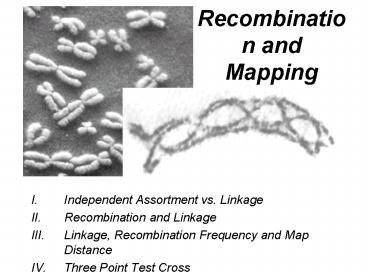Recombination and Mapping - PowerPoint PPT Presentation
1 / 14
Title:
Recombination and Mapping
Description:
... individuals possess 2 alleles that separate at Meiosis; 1 allele per gamete ... chromosomes and they separate at Meiosis; 1 homologous chromosome per gamete ... – PowerPoint PPT presentation
Number of Views:30
Avg rating:3.0/5.0
Title: Recombination and Mapping
1
Recombination and Mapping
- Independent Assortment vs. Linkage
- Recombination and Linkage
- Linkage, Recombination Frequency and Map Distance
- Three Point Test Cross
2
Questions to think about.
- How is the outcome of a cross different when two
genes are independently assorting as compared two
genes that are linked on the same chromosome? - What changes in the outcome of a cross when
alleles of two genes are in cis rather than
trans? - How do we calculate recombination frequency?
- How are map distance and recombination frequency
connected?
Think about these topics as we go through the
lecture and come back to them as you go over the
lecture material and practice problem solving.
3
A Review of Mendels Laws
- Mendels 1st Law
- Law of Segregation Diploid individuals possess 2
alleles that separate at Meiosis 1 allele per
gamete - The Cell Biology The 2 alleles are on homologous
chromosomes and they separate at Meiosis 1
homologous chromosome per gamete - Mendels 2nd Law
- The Law of Independent Assortment 2 alleles at
one locus separate independently of alleles at
other loci, if they are on different chromosomes. - The Cell Biology Pairs of homologous chromosomes
separate independently
4
A Hypothetical Comparison of Di-hybrid
Testcrosses Independent Assortment vs. Complete
Linkage
Mnormal leaves D tall mmottled leaves d
dwarf
5
Linked Genes and Chromosomal Recombination
6
Detecting Linkage with a Testcross
Parental
7
Detecting Linkage with a TestcrossA Chi-Squared
Analysis
- Null Hypothesis We hypothesize that the two
genes are unlinked - Expected Results
- 11 ratio of Non-recombinants to Recombinants
- 61.5 Non-recombinants
- 61.5 Recombinants
- Observed Results
- 108 Non-recombinants
- 15 Recombinants
- With ?2 70.2 and Df1, the probability is lt.005
that the genes are unlinked and differences are
due to chance. Reject hypothesis.
8
A Problem to Try
In tomatoes, tall (D) is dominant over dwarf (d)
and smooth fruit (P) is over pubescent fruit (p),
which is covered in fine hairs. A farmer has 2
tall and smooth tomato plants, which we will call
A and B. The farmer crosses A and B with the
same dwarf, pubescent plant and obtains the
following progeny
- What are the genotypes of plant A and B?
- Are the loci linked? If so calculate a map
distance (RF). - Why are the proportions of progeny different for
plant A and B?
9
The Relationship Between Recombination and Map
DistanceBuilding a Genetic Map
From Essential Genetics by Peter J. Russell
10
Underestimation of Map DistanceDouble
Cross-overs
11
Mapping With Three GenesThree Point Test Cross
12
Building a Genetic Map An Example of a Three
Point Test Cross
st, wildtype eye color (dominant) st, scarlet
eye color e, gray body (dominant) e, ebony
body ss, normal bristles (dominant) ss,
spineless bristles
- Determine
- Gene Order
- Map Distances
st, e, ss
st , e , ss
X
st , e , ss
st , e , ss
Important arbitrary gene order
13
The Results of the Cross
Genotype Phenotype Number Observed st e ss
wildtype 283 st e ss
all mutant 278 st e ss ebony,
spineless 50 st e ss scarlet 52 st
e ss spineless 5 st e ss
scarlet, ebony 3 st e ss ebony
43 st e ss scarlet, spineless
41 Total 755
14
The Genetic Map of the Drosophila Genome































